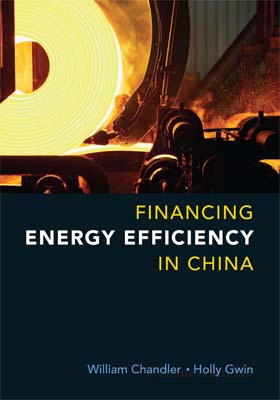Source: Carnegie Endowment
 As delegates in Bali struggle to agree on a climate change treaty, a new report from the Carnegie Endowment argues that reforming China’s financial sector can curb China’s greenhouse gas emissions even as work continues on an international treaty. China’s impressive national policies to promote clean and renewable energy have been undermined by unnecessary financial hurdles and bureaucratic struggles that increase financial risks and costs for potential investors.
As delegates in Bali struggle to agree on a climate change treaty, a new report from the Carnegie Endowment argues that reforming China’s financial sector can curb China’s greenhouse gas emissions even as work continues on an international treaty. China’s impressive national policies to promote clean and renewable energy have been undermined by unnecessary financial hurdles and bureaucratic struggles that increase financial risks and costs for potential investors.
In Financing Energy Efficiency in China, leading climate expert and Carnegie Senior Associate William Chandler argues that restrictions on debt financing and foreign equity investment, unfavorable tax policies, and even the United Nations’ emissions trading system all discourage foreign investment in clean energy in China.
Chandler concludes that to encourage investment in clean energy, China should:
- Exempt clean energy investments from foreign exchange, foreign-invested enterprise, and industrial policy controls
- provide tax exemptions for clean energy companies and services—particularly in regards to the value added tax (VAT), which sucks up 17 percent of total revenues
- make risk-based clean energy lending more worthwhile for banks
- provide loan guarantees for energy-efficiency projects in China
- reduce required paperwork for clean energy investment; and
- address restrictions created through the emissions trading system that actually increase risk to investors.
“Removing barriers to clean energy investment in China is an essential step toward climate protection. The incentives and rules of a global climate treaty will be blunted and frustrated by distortions of the world’s largest potential clean energy marketplace unless policy makers recognize and deal with the realities of that market,” argues Chandler.
Click on the links above for the full text of this Carnegie report.
About the Authors
William Chandler is a senior associate at the Carnegie Endowment and director of Energy and Climate Program. Chandler has spent over 35 years working in energy and environmental policy and was a lead author for the Nobel Prize winning Intergovernmental Panel on Climate Change. He is president of Transition Energy, co-founder of DEED China, and founder and former director of Advanced International Studies at the Joint Global Change Research Institute. Chandler received the 1992 Champion of Energy-Efficiency Award from the American Council for an Energy Efficient Economy for his work. In 1999, he received the first Global Climate Leadership Award from the International Energy Agency. He has authored or co-authored ten books which have been favorably reviewed by scholarly and popular critics and translated into several foreign languages.
Holly Gwin is general counsel and co-founder of Transition Energy. Gwin served six years in the Clinton administration as general counsel and staff director of the White House Office of Science and Technology Policy, where she reported directly to the President’s science advisor. She also worked as staff director of the President’s Commission on Gulf War Veteran’s Illnesses, and previously served as General Counsel of the U.S. Congress Office of Technology Assessment. Gwin has published widely in science policy. She holds a law degree from the University of Tennessee and is a member of the District of Columbia Bar.





.jpg)